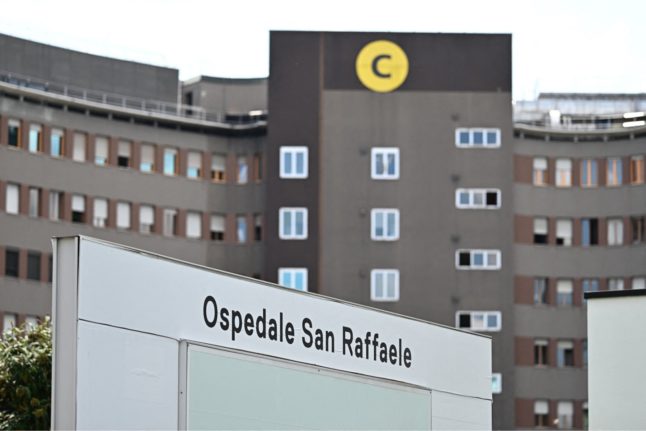Sitting in her garden in rural Tuscany, Tara Gould, a 55-year-old British national, reminisces about her old job back in the United Kingdom.
“It was such a support group for people like me, so to be able to work for it and help other women was such a bonus,” Tara says.
The support group Tara worked for was the Latte Lounge, an online community for UK women over the age of 40 going through menopause. The site had resources such as articles, help finding a nearby specialist and in-person events. Tara managed the emails sent in by women who were either asking questions or struggling.
READ ALSO: Public vs private: What are your healthcare options in Italy?
“I had a few women reach out to me who were feeling suicidal and had nowhere to go or no one to ask about what they were going through. Talking to them about their options and helping them out, helped me out too.
But in Italy, she says, “I cannot find any support network like that here.”
In the two years she’s been living here full-time, Tara has had to go back to the UK for her hormone replacement therapy (HRT) which is crucial in managing symptoms such as hot flashes, sleep problems, and low moods.
“In Italy, it is like what it was like in the UK 30 years ago, and coming from there two years ago was a massive shock to the system,” she adds.
“Women just have to grin and bear it.”
She believes the situation in Italy boils down to a lack of knowledge and possible embarrassment about discussing menopause. While the UK is far from perfect on the issue, she says, there is help available for women needing it, while Italy is “behind the times”.
READ ALSO: Why are medicines so expensive in Italy?
Tara is not alone in feeling this way. A post on the topic in one expat Facebook group this month sparked a lively discussion, attracting hundreds of comments from women in Italy sharing their personal stories, advice, and observations on the differences in menopause treatment between Italy and other countries.
But, she says, continuing to travel back to the UK for this routine treatment is “becoming too expensive for me especially as I’m paying into the SSN here too.
“I shouldn’t have to go back to the UK for this.”
Tara returns to the UK once her medication finishes and forks out around €600 each time she goes: €100 for flights and €500 for the HRT medication via private healthcare.
“It should be a standard medical procedure, but it isn’t here. I can’t keep on going back to the UK and paying out every time I need something, because it is a need not a want.”
Tara started going back to the UK after her family doctor in Italy told her they didn’t prescribe HRT and advised her to buy it online, go abroad or go to a gynaecologist.
“I thought it was outrageous that a female doctor was telling me these things, especially someone trained in the medical field advising a patient to buy medication online.
“I don’t feel hopeful,” Tara says.
Without her oestrogen, Tara says her anxiety goes through the roof making everyday life a struggle. She’s too worried she’d be dismissed in the same way her doctor dismissed her if she went to a private gynaecologist here.
“It’s worrying. I don’t know what I’ll do. There must be someone here, but I don’t know how I feel. They tend to be more city-focused, and if I’m going to Rome I might as well go to the UK,” she adds.
In a recent study named Menopause: Knowledge, attitude and practice among Italian women co-written by Italian biologist Paola Mosconi along with six other researchers, more than half of their study sample (women with menopause) had not received any information about the condition and possible therapies.
Another survey conducted in 2021 found only 7.6 percent of the 1028 Italian women surveyed were on HRT. The majority of them were on herbal remedies.
Whilst a global shortage of HRT was widely reported last year, both the studies found medical expertise in the field of menopause to be only “satisfactory”.
READ ALSO: OPINION: Why Italy’s private healthcare isn’t always worth the cost
This is in spite of the Italian health ministry’s webpage outlining the numerous benefits of hormone therapy for menopausal women, such as improved heart health and a reduced risk of strokes.
Tara says she feels as though the lack of information on this topic trickles down into society, as she has tried talking to her Italian friends about it with little success.
For Liguria-based Noah, from the United States, the experience of obtaining HRT from her doctor was not an easy task.
Like Tara, she finds there is a huge lack of education for practitioners and the general public not just on HRT but around menopause in general, which differs from her experience back home. She also thinks views on it are outdated.
She moved over to Italy four years ago whilst she was going through the change.
“Our family doctor would not prescribe it and lacked any knowledge around it so she sent us to private clinics instead,” Noah says. “I can laugh about it now, because I finally have it, but it was very frustrating in the beginning.”
Noah and her husband, who is Italian, found out about a doctor in another region who specialised in menopause and whose work on the condition was published in medical journals. She got her HRT from him. Whilst Noah felt very comfortable in his care, she had to stop visiting him because of the distance.
“We went back to our family doctor with literature on the use of HRT and the effects of stopping it abruptly. She then did her own research and now has started prescribing it to me,” Noah says.
Noah largely considers herself lucky. Nevertheless, she has to drive 45 minutes to another town in the region to pick up her prescription.
READ ALSO: ‘Very professional but underequipped’: What readers think of Italy’s hospitals
Tuscany resident Kelly Hodgson, like Noah, has also had to do extensive research into the benefits of HRT before she was prescribed it. She found the process of obtaining her medication extremely time-consuming and disheartening.
“I had to do all the research myself until finally I found a gynaecologist who is open to HRT,” Kelly explains.
Kelly feels like she should have been able to get HRT from her doctor rather than pay privately. She argues that Italy is advanced in most areas of medical care – but not for menopause.
She thinks a huge reason why doctors are hesitant about giving it out is because they associate it with a high cancer risk.
“There is so much scaremongering,” she continues. “My doctor is female and she point blank said to me no, because I could get cancer, even though I’ve been on the contraceptive pill for years which comes with its own cancer risks.
“I come from a family with osteoporosis so HRT is beneficial to me. If I were in the United Kingdom now, I’d have access to it without having a full gynaecological visit before it’s prescribed.”
Kelly says friends from Turin who are also going through the menopause have had to go privately too, rather than get treatment from their doctor.
“There has to be more education on menopause here,” Kelly concludes.
For Noah and Kelly at least, their journey to get their medication is within the country. For Tara, unless things change culturally and medically, going abroad is the only option she feels comfortable with.
“The way Italians think about menopause is the old-fashioned way everyone used to think. They view us as grumpy old women rather than looking at the reasons,” Tara says.
“It’s just something you have to deal with. It’s frustrating to say the least.”



 Please whitelist us to continue reading.
Please whitelist us to continue reading.
Member comments